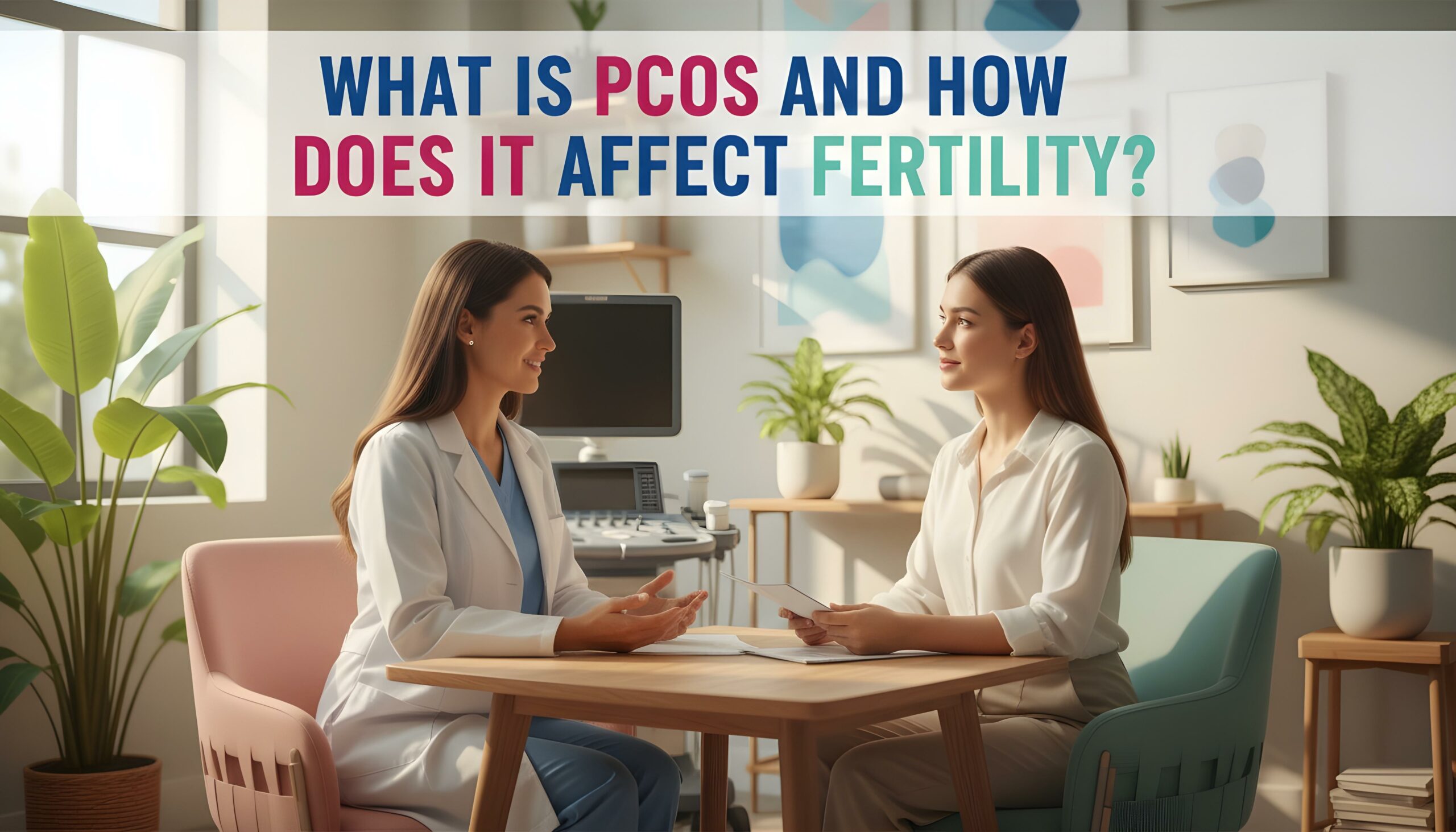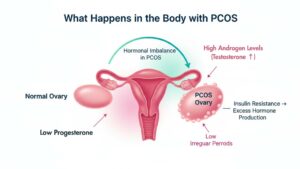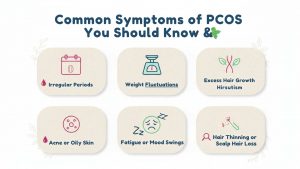Polycystic Ovary Syndrome (PCOS) is a hormonal problem that makes periods go off and on, and causes ovarian follicles to be too small. Because PCOS makes ovulation less regular, this imbalance makes it harder for eggs to develop and release on time. Because of this, a lot of women with PCOS have hormonal complaints, late periods, and trouble getting pregnant.
The good news? With the right treatment, lifestyle changes, and hormonal support, PCOS and fertility can be controlled, and many women are able to get pregnant.
For a free consultation, call +91 9311850412 or email info@fertilityworld.in.
Introduction
Have you ever thought why your periods are irregular, why you feel bloated or tired often, or why getting your period feels harder than it should? Don’t worry, just like you, many women are reading this who are experiencing these without realizing that they may be connected to Polycystic Ovarian Syndrome (PCOS).
In this guide, we will help you to know what PCOS means, how it affects fertility and how to deal with it. We will also cover how to recognize women with PCOS symptoms, and learning effective treatments for PCOS and infertility. If you start to know your own body, then it’s a first step towards healing, and your journey to balance and hope begins.
What is PCOS (Polycystic Ovary Syndrome) and Why It Happens
Polycystic Ovary Syndrome (PCOS) is a known hormonal problem that affects women these days. It happens when the ovaries make too many androgens, male hormones that can cause irregular periods, small cysts on the ovaries, weight changes, acne, and sometimes, it can cause problems getting pregnant. But it can be easier to deal with if you know why it happens.
Why Does Polycystic Ovary Syndrome Happen?
- Insulin Resistance: Your body might not use insulin correctly, which can cause insulin levels to rise. This can make your ovaries make more male hormones (androgens), which can stop ovulation.
- Hormonal Imbalance: Women with PCOS may have greater levels of androgens, such as testosterone. These extra hormones can stop eggs from growing or being released.
- Genetics: PCOS often runs in families. You’re more likely to have it if your mom or sister does.
- Inflammation: Some studies suggest that low-grade inflammation in the body may induce the ovaries to make androgens, which may be one of the reasons for PCOS.
- Lifestyle: Taking too much stress, no exercise and eating unhealthy foods can also be the cause of PCOS symptoms.
Your doctor can tell if you have PCOS by looking at your symptoms, checking your hormone levels using blood tests, and doing an ultrasound to look at your ovaries. Getting diagnosed with PCOS early can help you deal with your symptoms better and keep your health in good shape for a long time.
Can PCOS Cause Infertility?
While PCOS is one of the leading causes of fertility challenges, can it also cause infertility? Not always. Irregular ovulation makes it harder to get pregnant, but many women with PCOS can get pregnant naturally or with medical help, with the right changes to their lives and the right treatment.
What happens if PCOS is left untreated?
If you don’t take care of your PCOS, it can increase your risk of 2 types of diabetes, high blood pressure, heart issues, and endometrial problems. That’s why it’s so important for your health in the future to take care of PCOS early on, either with lifestyle changes, medication, or both.
Causes of PCOS and Hormones That Affect Fertility
Hormones are the most important thing when it comes to PCOS. Your body has to be in balance to ovulate and stay fertile, but PCOS makes it difficult to get pregnant by throwing off that equilibrium.
Let’s find out what hormones are involved and how they change your chances of getting pregnant.
The Hormone Connection
LH and FSH work together to help your eggs grow and then release them during ovulation. When you have PCOS, LH levels are generally too high relative to FSH levels. This hinders your eggs from growing properly.
Testosterone levels rise with PCOS (yep, women get it too!). This extra androgen stops ovulation, which makes periods come at odd times or not at all.
Insulin makes things harder. A lot of women with PCOS are insulin resistant, which means their bodies make more insulin to keep their blood sugar levels stable. The problem is that insulin resistance elevates androgen levels, which causes your ovaries create more testosterone. This makes a cycle that inhibits ovulation and makes periods erratic.
Your progesterone hormone helps your pregnancy. If you don’t ovulate consistently, your progesterone levels stay low, which makes it challenging to get pregnant.
How to Read Your Hormone Tests
With simple blood tests, your doctor can examine these hormones. This is what each one shows:
| Hormone | What It Does | How It Affects Fertility in PCOS | Test Name |
|---|---|---|---|
| LH & FSH | Controls egg maturation and ovulation | High LH/FSH ratio prevents eggs from releasing | LH/FSH ratio test |
| Testosterone | Regulates reproductive functions | Too much testosterone blocks ovulation completely | Androgen profile |
| Insulin | Manages blood sugar levels | High insulin triggers excess testosterone, causing irregular cycles | Fasting insulin test |
| Progesterone | Prepares uterus for pregnancy | Low levels mean your body can’t support implantation | Day-21 progesterone test |
How PCOS is Diagnosed and When to See a Doctor
Are you worried that you could have PCOS? The good news is that diagnosing PCOS is very simple, and the sooner you know, the easier it is to take care of and safeguard your fertility.
How doctors figure out whether you have PCOS
Most of the time, your doctor will employ a mix of three basic methods:
1. Your Symptoms and Medical History
They’ll want to know about your periods (are they irregular or missing?), any unusual hair growth, acne, weight changes, and if anyone in your family has had PCOS.
2. Tests of hormones in the blood
What kinds of blood tests are done for PCOS? Your doctor will check your hormones to see whether they are out of balance. Some common tests are for LH, FSH, testosterone, insulin, and thyroid function. These tests help find out what’s making you feel bad.
3. An ultrasound of the pelvis
An ultrasound allows your doctor to examine if your ovaries are bigger than normal and look for small cysts on them. Not everyone with PCOS has cysts that can be seen, but this is one part of the puzzle that helps doctors figure out what’s wrong.
When to See a Doctor for Polycystic Ovary Syndrome
Don’t wait too long if you’re experiencing warning signs. When to see a doctor for PCOS? Here’s when you should book an appointment:
| Warning Sign | Why It Matters | What to Do |
|---|---|---|
| Your periods are absent for 3+ months | This could mean you’re not ovulating, which affects fertility | See a fertility specialist or gynecologist soon |
| Very irregular cycles (longer than 35 days or shorter than 21 days) | Irregular ovulation makes it harder to conceive | Get hormone levels checked |
| Struggling to get pregnant after 6–12 months of trying | PCOS may be blocking ovulation | Consult a fertility doctor for evaluation and support |
| Excessive hair growth, severe acne, or unexplained weight gain | These are signs of high androgen levels | Visit your doctor for blood tests and early diagnosis |
| Dark patches on skin (especially neck or underarms) | Could indicate insulin resistance linked to PCOS | Check fasting insulin and glucose levels |
Common Symptoms of PCOS You Should Know
This is the hard part about PCOS: it doesn’t look the same for everyone. Some women have PCOS symptoms, while others don’t notice anything at first. This makes it challenging to find out about it early on. You can have all of these indicators, only a few, or none at all.
Let’s go over the symptoms of polycystic ovaries so you know what to look for.
The Signs That You Might Have PCOS
- Irregular or Missing Periods– This is generally the first sign. Your periods could arrive every few months, continue for weeks, or not come at all. PCOS could be the reason why your cycle is all over the place or not at all.
- Stubborn Acne and Oily Skin– Do you have Adult acne that won’t go away, especially on your jawline, chin, and chest? Even if you never experienced acne as a teenager, high testosterone levels can make your skin very greasy and cause breakouts.
- Thinning Hair on Your Scalp– Androgenic alopecia is when the hair on your head starts to thin or fall out, even while hair is growing in places you don’t want it to. It’s the reverse of what you want, and it shows that your hormones are out of balance.
- Unexplained Weight Gain or Trouble Losing Weight– Many women with PCOS have trouble with their weight, especially around their stomachs. It may not be possible for you to lose weight even if you diet and work out because of insulin resistance.
- Feeling tired and bloated all the time– Being tired all the time, even after a good night’s sleep? PCOS can make you feel tired. You may also feel swollen or painful, especially around your middle.
- Difficulty Getting Pregnant– PCOS is one of the main reasons people can’t have children because it affects ovulation. If you’ve been trying to get pregnant but haven’t been able to, this could be a big red flag.
- Mood swings, stress, or sadness- Not only do hormones change your body, they also change your mind. A lot of women who have PCOS deal with worry, depression, irritability, or mood swings. It’s not “all in your head”—it’s real and true.
- Dark Skin Patches (Acanthosis Nigricans) – There may be velvety, dark spots on your neck, underarms, or thighs. You shouldn’t ignore this because it means your body is resistant to insulin.
How PCOS Affects Fertility and Ovulation
If you have PCOS, you may be thinking about how PCOS affect fertility. The more important question is: can a woman with PCOS get pregnant?
In short, the answer is yes, of course. But you might have to put in a little more work. The main issue? PCOS can lead to delayed ovulation or anovulation, which means that there are fewer chances to get pregnant. Hormonal imbalances can also lower the quality of your eggs and the lining of your uterus, which makes it harder for the embryo to implant. It’s possible to have PCOS and still ovulate, though. Of course! Women who have mild PCOS often ovulate once in a while and can get pregnant on their own.
Why Ovulation Becomes Irregular with Polycystic Ovary Syndrome
One cell grows and releases a fully developed egg every month. In PCOS, several small ovaries begin to grow but stop halfway. They can’t develop or release an egg, so they just sit there as tiny cysts. When LH and FSH levels are high, the process is stopped, and you don’t ovulate.
Can You Get Pregnant with PCOS Naturally?
Of course. Many women can get pregnant naturally by making changes to their lifestyle, eating well, and keeping an eye on their insulin levels. About 80% of women with PCOS get pregnant, either on their own or with a little help from their doctor.
Chances of Getting Pregnant with PCOS Naturally or with Treatment
Let’s talk about the question that everyone wants to know: What’s the probability of getting pregnant with PCOS? The real answer? Several things play a role, but the chances are better for you than you might think.
Your Age Matters (But Don’t Panic!)
Yes, getting older does affect your ability to have children, even if you don’t have PCOS. These are the facts about women with PCOS:
| Age Group | Chance of Pregnancy Naturally | With Treatment (Letrozole/Metformin) |
|---|---|---|
| Under 25 | 40–60% | 70–80% |
| 25–30 | 30–50% | 60–70% |
| Above 30 | 20–40% | 50–60% |
What’s the best age to get pregnant with PCOS? When it comes to pregnancy, it’s easier to do things early on, but that doesn’t mean it can’t be done later. Women with PCOS can get pregnant all the time, even in their 30s and 40s, as long as they get the right help.
Fertility Treatments That Help Women Get Pregnant with Polycystic Ovary Syndrome
Don’t give up if you’re trying to get pregnant naturally but are having trouble because you have PCOS. There are treatments that have been shown to work, and you’re not the only one who needs some help.
Medications that cause ovulation
So, what medication is used for PCOS pregnancy? Let’s talk about what we can do:
- Letrozole, also known as Femara, is the first drug that your doctor will probably try. It gently tells your ovaries to make an egg. You may be thinking about how many cycles of Letrozole it takes to get pregnant with PCOS? Most women respond within 2 to 3 cycles.
Most of the time, it takes three to six cycles, although some women get pregnant on the first or second try. Please be patient; it’s working! - Clomiphene Citrate (Clomid) is another old ovulation drug that works. Studies have shown that Letrozole works a little better for women with PCOS, but this medicine works about the same.
- Metformin: Does Metformin help with PCOS and pregnancy? Of course! It won’t make you ovulate on its own, but it does help with insulin resistance, which is often the reason why your cycles aren’t regular. When taken with Letrozole or Clomid, it makes your chances of getting pregnant much higher.
IUI and IVF for PCOS — Which is Better?
If the medicine you were taking didn’t help with your PCOS, you might think that IUI or IVF would be better.
IUI (Intrauterine Insemination) can help as long as you’re taking medicine to make you ovulate and still can’t get pregnant. It locates sperm perfectly. It’s simpler, doesn’t cost as much, and is a great next step before IVF.
With severe PCOS, blocked fallopian tubes, or after many IUI rounds that didn’t work, IVF for PCOS patients is the best option for people who want to get pregnant. It’s harder and costs more, but it’s the most likely to work. Keep in mind that every woman with PCOS has a unique story. No one is perfect, and that’s okay. It’s important to work closely with a PCOS-specialist fertility doctor who will listen to you and have faith that things will work out for the best. Don’t worry!
Keep in mind that every woman with PCOS has a unique story.
No one is perfect, and that's okay. It's important to work closely
with a fertility expert who will listen to you and have faith that
things will work out for the best. Don't worry!
Final Thoughts — Living Fully and Fertile
In all honesty, PCOS can be very stressful, especially if you want to start a family. It’s hard to carry around the troublesome periods, hormonal issues, and worry about getting pregnant when you have PCOS.
That being said, you should know: can you live long with PCOS?. Yes, definitely. PCOS patients live long, happy, and healthy lives with the right medical care, healthy lifestyle choices, and help from their doctors. Don’t let PCOS define you; it’s only a part of your story.
Getting pregnant with PCOS may take longer, but it’s not impossible. Daily, thousands of women with PCOS have babies. For some, changing their lifestyle can help them get pregnant naturally. For others, drugs or IUI or IVF are necessary. People with PCOS can get pregnant if they get the right help and advice.
Do not worry about your body being broken. Support, understanding, and patience are all it needs. So do you. You don’t have to go through PCOS management alone.
Are you prepared to move forward? For people with PCOS who are trying to get pregnant, please don’t go through this process by themselves. For individualised care, caring support, and tried-and-true fertility treatments that are made to your specific needs, contact Fertility World. Your dream of having a child is attainable; let’s make it happen.




